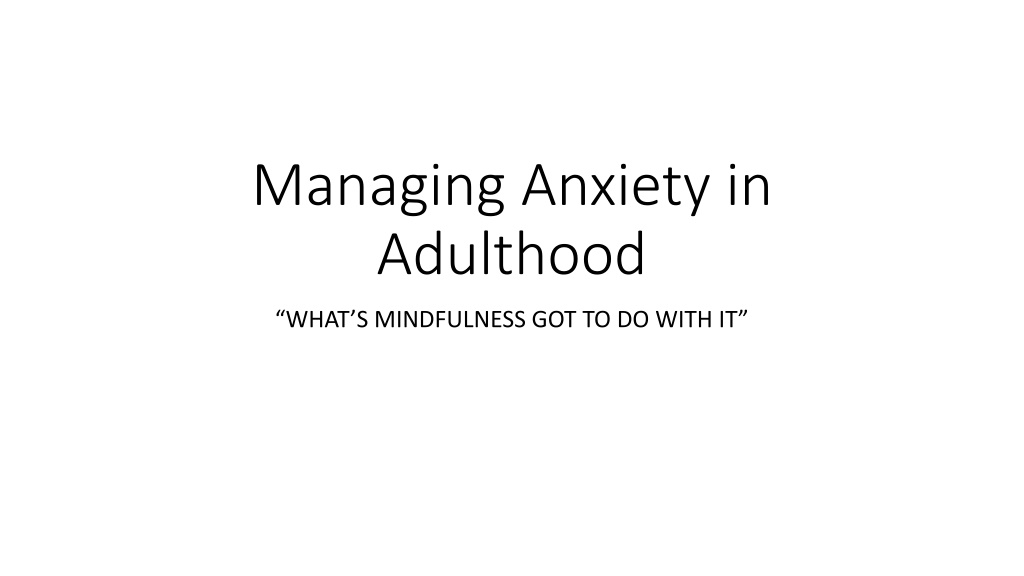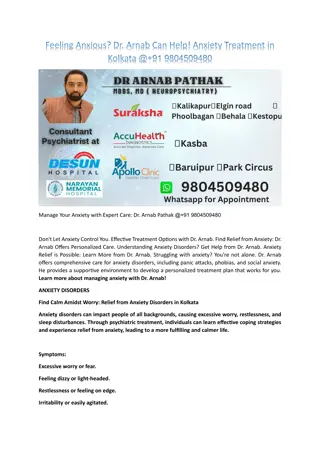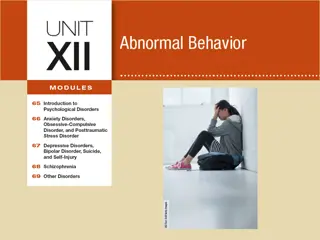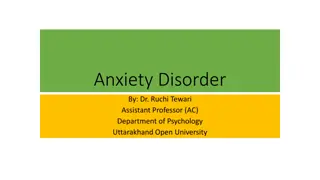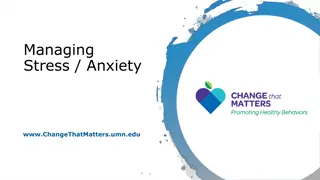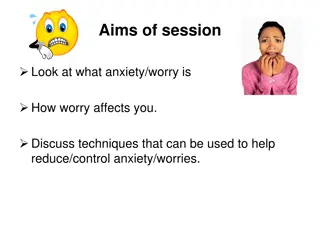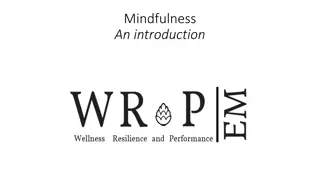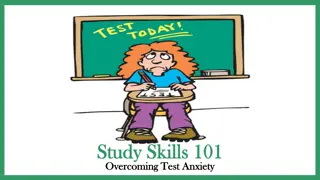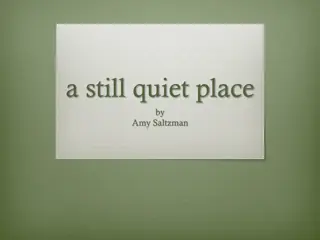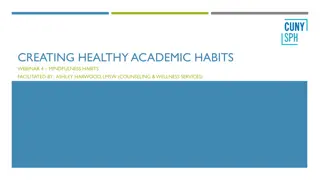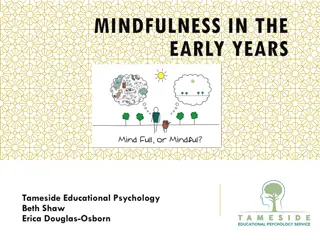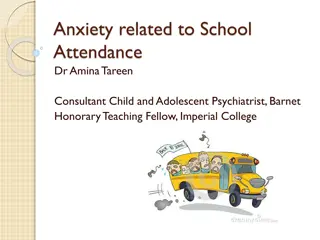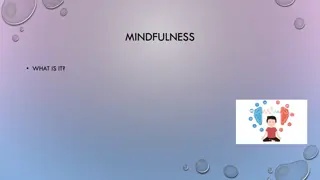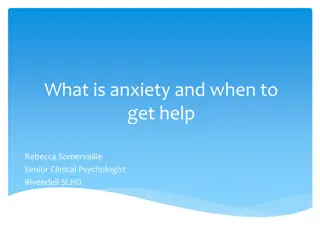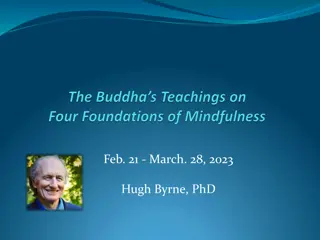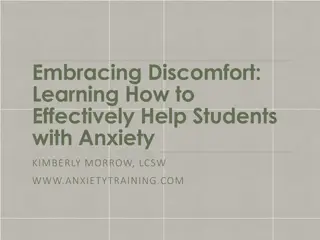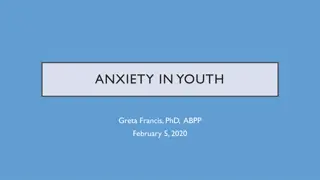Adult Anxiety: The Role of Mindfulness
Exploring the connection between mindfulness and managing anxiety in adulthood. Delve into dimensions of well-being, the cellular basis of anxiety, and psychological perspectives on motivation and goal-setting.
Download Presentation

Please find below an Image/Link to download the presentation.
The content on the website is provided AS IS for your information and personal use only. It may not be sold, licensed, or shared on other websites without obtaining consent from the author.If you encounter any issues during the download, it is possible that the publisher has removed the file from their server.
You are allowed to download the files provided on this website for personal or commercial use, subject to the condition that they are used lawfully. All files are the property of their respective owners.
The content on the website is provided AS IS for your information and personal use only. It may not be sold, licensed, or shared on other websites without obtaining consent from the author.
E N D
Presentation Transcript
Managing Anxiety in Adulthood WHAT S MINDFULNESS GOT TO DO WITH IT
Anxiety in Adulthood Anxiety in Adulthood The Present The Present Its been a long day Blood sugar levels are high People are tired/stressed People are in a transition (last presenter and Friday to boot) People s attention is transition as well People are not present 100%
Anxiety in Adulthood Anxiety in Adulthood Eight Dimensions Eight Dimensions Taking care of our bodies (physical health) provides us the capacity to learn and think (knowledge) about who we are (spirit), what we want (emotions), in such a way as to develop trust in our ability to support ourselves (occupation), maintain our life goals over time (finances), as well as manage our (social) resources and where we live (environment) in order to maintain health and happiness effectively, with optimal stress.
Anxiety in Adulthood Anxiety in Adulthood The Process The Process Seligman s View on Anxiety Cellular motive Cells that work and duplicate survive, Cells that duplicate the process survive Cells that develop sensory capacity begin to establish survival as a physiological goal Cells that develop sensory capacity to feel the difference between survival and non-survival begin to worry about mistakes (past) and and failure (future) SURVIVAL MANDATES THAT WE BE HARDWIRED TO SET GOALS AND WORRY
Anxiety in Adulthood The Motive Bowen s View on striving and worrying Underlying powerful force of Individuality (striving to survive my way) Underlying powerful force of Belongingness (need of others) Forces compel us to pursue our goals and others as a resource Forces compel us to distance from difficulties and adversaries Forces compel us to develop compensatory solutions
Anxiety in Adulthood The Content Erickson and Life cycle Identity (Who are we, what do we want and where are we going) Relationships (Establishing and managing our social resources) Survival of the Species (Taking care of our young so they survive) Making peace with our decreasing success, increasing failures and our own demise
Anxiety in Adulthood Eight Dimensions The 8 Dimensions as the process of life Goals and Action oriented Taping Individuality as a life force Using Belongingness as a life force Accepting our givens as a starting point Building Resilience and Strength Create and execute a path to a good life Staying in the present to reduce worrying
Anxiety in Adulthood Anxiety in Adulthood Mindfulness 1 Learning Mindfulness 1 Learning Developing a Path Lao Tzu Watch your thoughts they become words Watch your words they become actions Watch your actions they become habits Watch your habits they become character Watch your character IT BECOMES YOUR DESTINY
Anxiety in Adulthood Mindfulness 2 Regulation THE WORRYING PROCESS - Seligman Being Present and dealing with vulnerabilities and strengths Being an Individual and having a place to go Being Resourceful and having the needed support Being in the present and using energy with action that works
Anxiety in Adulthood Anxiety in Adulthood Mindfulness 3 Observation Mindfulness 3 Observation Jon Kabat-Zin (2003) definition of Mindfulness The awareness that emerges through paying attention on purpose, in the present moment, and non-judgmentally to the unfolding of experience moment to moment
Anxiety in Adulthood Embedded in the model is Mindfulness as a tool. Mindfulness is paying attention to what works and does not work. You create a life for yourself, you pay attention and use your resources to create the life. Observe Describe Without Judgment Increase your awareness Choose critical things to change Focus on effective changing one thing at a time Take action I wish I had thought of this myself but credit is due to Linehan and DBT
Anxiety in Adulthood Lao Tsu as the answer Watch your thoughts it is the only thing that matters because it is the reality that affects you (psychological reality) Thoughts/feelings are your conceptualization Watching is being present . If your not present you are not watching Stay in the present (use the past and future but don t life there Helpful to people who worry present is the only thing you can control. Raises issue of honest with self Watch your words Words a public thoughts are not This raises the issue of honesty
Anxiety in Adulthood Lao Tsu as the answer Watch your words Words a public thoughts are not This raises the issue of honesty
Anxiety in Adulthood Lao Tzu the framework for creation Mindfullness is the thinking process DBT is the daily skill Attend Accept reality (phenomenological vs real) Manage and Utilize feelings Manage stress Managing your resources (using people and resolving conflict)
Anxiety in Adulthood Relationship to Circle Body (Diet, exercise, Active, Sleep, Weight, Regular Physical) Emotions (Support, Sensitivity, Stress Management, Physical Health) Knowledge (Challenge self, Learn, Create, Explore different Ideas) Environment Work Finances Beliefs Connections
Some people are doing it well because They have the right genetics (skills) They have the right motivation They have had the right Role models They have had enough practice But some people have had little to none But they may still have the desire But they may not have the desire and may have the skills We judge that people know or should know. Knowing Self Accepting Self Living in the moment Accepting Challenges Mutuality and Reciprocity I am part of the environment : it works the same way for everybody
